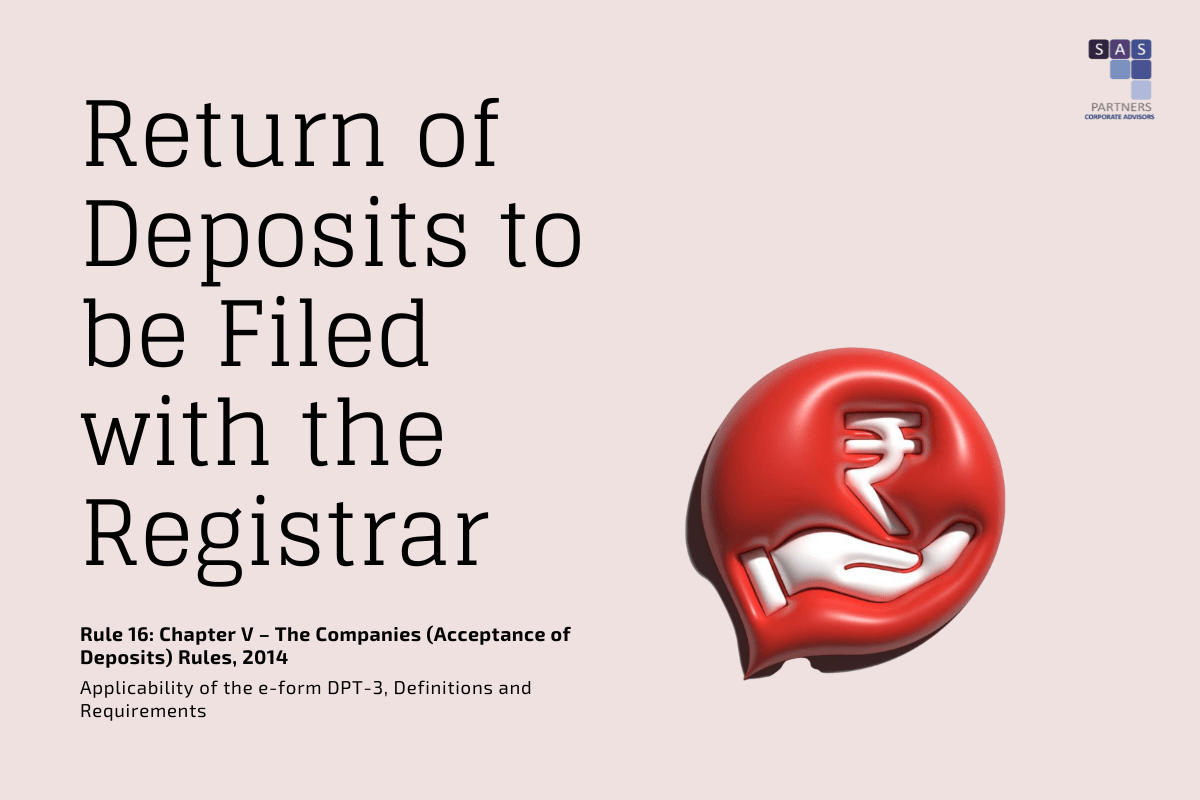Rule 16: Chapter V – The Companies (Acceptance of Deposits) Rules, 2014

1. What is the applicability of the e-form DPT-3?
As per Rule 1(3), this e-form is applicable on all the companies except:
- a banking company
- a non-banking financial company registered with the Reserve Bank of India
- a housing finance company registered with the National Housing Bank established under the National Housing Bank Act, 1987
- a company specified by the Central Government under the proviso to sub-section (1) of section 73 of the Act
- a Government company
2. Whether the Form DPT-3 needs to be filed by a company under the process of liquidation/ strike off?
The Company has to File DPT-3 unless the Ministry of Corporate Affairs reflects that the Company has been struck off/liquidated
3. Can the company change its registered email ID in the MCA by using this form?
Yes, as per the help kit the company can change the email Id through this form.
4. What step to be taken by the company if the objects clause prefilled is not matching with the objects of the company?
As per the ICSI webinar, the company shall proceed to file DPT-3 even if object clause does not match with MOA. However, it is recommended to attach a declaration in the form as an attachment duly signed.
5. Which financial statement shall be considered while mentioning Net worth in the form?
As per DPT-3 “Net Worth as per the latest audited balance sheet preceding the date of the return”
Therefore, if Balance sheet of 31.03.2022 is Audited, then figure of 31.03.2022 can be used. However, if Financial of 31.03.2022 not audited, then figures as per financial statement as on 31.03.2021 need to be mentioned in form.
For the companies incorporated after 01.01.2021 whose accounts are yet to be audited, we may mention the Net Worth based on the un-audited financials.
6. A Company has obtained ECB from Holding company. Should the same be reported?
There is no specific exemption granted for reporting monies received in any form from a Holding/Subsidiary or Associate Company. Therefore, any amount obtained from them has to be disclosed in “Foreign body corporate”
7. In which Field will Loan taken from non banking financial institution be reported in Form DPT-3?
Since, the loan has been received from NBFC, which happens to be a company itself, such transaction will require to be reported in “Any amount received by the company from any other company”
8. What is the treatment to be given if a company has raised money by issue of CCD/NCD/ OCD?
CCD – If it is secured/unsecured and convertible into shares with in 10 years will be treated as exempted deposits
NCD – It is unsecured and listed on stock exchange, will be exempted deposits.
OCD – If it is secured then will be treated as Exempted Deposit
9. What is the treatment of Advances under Companies (Acceptance of Deposit) Rules, 2014?
Any amount received as
- Advances from Customers for supply of goods or services, appropriated within 365 days from the date of acceptance of such advance [Provided that in case of any advance which is subject matter of any legal proceedings before any court of law, the said time limit of three hundred and sixty five days shall not apply]
- Advance for immovable property under an agreement provided that such advance is adjusted against such property in accordance with the terms of arrangement or agreement as security deposit for the performance of the contract for supply of goods or provision of services
- Advance for long term projects for supply of capital goods except those covered under (b)
- Advance towards consideration for providing future services in the form of a warranty or maintenance contract as per written agreement or arrangement, if the period for providing such services does not exceed the period prevalent as per common business practice or five years, from the date of acceptance of such service whichever is less
- Advance received and as allowed by any sectoral regulators or in accordance with directions of Central Government or State Government
- Advance for subscription towards publication whether in print or in electronic to be adjusted against receipts of such publications
10. What happens in case any of the above transactions become refunded?
If the amount received under items (a), (b) and (d) above becomes refundable (with or without interest) due to the reasons that the company accepting the money does not have necessary permission or approval, wherever required, to deal in the goods or properties or services for which the money is taken, then the amount received shall be deemed to be a deposit under these rules on the expiry of fifteen days from the date they become due for refund.
11. If a share application money is received from a foreign body corporate, will it be treated as monies received from foreign source under rule 2(c) (ii) or rule 2 (c) (vii)?
Since it is a share application money, it has to be reported under “Any amount received and held pursuant to an offer made in accordance with the provisions of the Act towards subscription to any securities including share application money or advance towards allotment of securities pending allotment, so long as such amount is appropriated only against the amount due on allotment of securities applied for.”
Provided, if the company has neither allotted the shares within 60 days nor refunded within 15 days, the said share application money shall be considered as Deposits.
12. Whether any amount received from any employee of the company will be considered as deposit?
Any amount received from an employee of the company not exceeding his annual salary under a contract of employment with the company in the nature of non-interest bearing security deposit is considered as exempted deposit and the same has to be reported in “Any amount received from an employee of the company not exceeding his annual salary under a contract of employment with the company in the nature of non-interest bearing security deposit.”
In case a person who has lent is both Director as well as an Employee of the company, it has to be checked how the transactions are treated in the financial statements. The same treatment has to be given in DPT-3 as well.
13. Whether “Derivative Financial Instruments” shown under “Financial Liabilities –Others” which represents the loss towards the forward contracts, are also required to be considered as Exempted deposit for the purpose of filing DPT-3?
For a transaction to qualify as a deposit, the same has to be preceded with the receipt of money, followed by an obligation of repayment in the form of money. Therefore, Derivative Financial Instruments shall neither be treated as deposits nor exempted deposits
14. What is the treatment to be given for Incentives or Grants received from government?
As per rule 2(1)(c)(i) under the head “any amount received from the Central Government or a State Government are exempted deposits and the same as to be reported under specified criteria.
15. What is the treatment to be given for Loan from any director who has resigned from the company in case of Private Company?
As per rule 2(1)(c)(viii) states that ‘any amount received from a person who, at the time of the receipt of the amount, was a director of the company or a relative of the director of the Private company” and the same as to be reported under “Any amount received from a person who, at the time of the receipt of the amount, was a director of the company or the relative of the director of a private company.”
16. What is the treatment to be given for Loan from a sole proprietorship of a Director?
A director who is having a sole proprietorship will be considered himself as a director and since loan from director is exempted deposit, the same treatment to be given subject to declaration from director that these funds are not borrowed.
17. If a Private Limited Company takes Loan from the person who is both Director and a Member of the Company, then this will come under exempted Deposit or Deposits?
As per the Deposit Rules any amount received from Directors of the Company is treated as an Exempted Deposit. On the other hand any amount received from Member is treated as Deposit.
So treatment of this transaction would depend how the same has been booked in the Financials and whether the lent amount is owned or borrowed.
18. What shall be treatment of a loan, If at the time of acceptance of Loan, nature of lender was Company, however later on during the term of continuation of loan such company convert themselves into LLP.
In order to check whether the loan is a deposit or not, nature on the date of transaction has to be taken into consideration. Changing the status of the lender does not have any impact of the reporting(borrowing) company.
19. What is the treatment to be given for: A private limited company/start up company as referred under rule has accepted loan from members; what is the treatment that has to be given?
Loan from Members shall be treated as Deposits irrespective of the limits prescribed subject to compliance benefits available with Private / Start-up Companies.
In case of private company – Clause (a) to (e) of Sub-section 2 of Section 73 shall not apply to private Companies:
Issuance of a circular to its members including therein a statement showing the financial position of the company, the credit rating obtained, the total number of depositors and the amount due towards deposits in respect of any previous deposits accepted by the company in such manner as specified.
Filing a copy of the circular along with such statement with the Registrar within thirty days before the date of issue of the circular.
Depositing, on or before the thirtieth day of April each year, such sum which shall not be less than twenty per cent. of the amount of its deposits maturing during the following financial year and kept in a scheduled bank in a separate bank account to be called deposit repayment reserve account.
Certifying that the company has not committed any default in the repayment of deposits accepted either before or after the commencement of this Act or payment of interest on such deposits and where a default had occurred, the company made good the default and a period of five years had lapsed since the date of making good the default.
Note : This exemption is applicable to Private companies which has not committed a default in filing its financial statements and Annual return under this Act (MCA Notification dated 13th June, 2017)
20. What is the treatment to be given for: A company has raised an amount by issue of Bonds or debentures. What is the treatment that has to be given?
Any amount raised by issue of Bonds or Debentures shall be treated as Exempted Deposits, if they are secured by first charge on tangible assets and amount of such instruments do not exceed the market value of such assets as assessed by a registered valuer.
In case of CCDs if they are convertible into Shares within 10 years and the same as to be reported in “category (i) (A) or (B) accordingly”
21. A company has received an amount by way of issue of convertible notes. Should the company report the same?
Any amount of twenty-five lakh rupees or more received by a startup company, by way of convertible note (convertible into equity shares or repayable within a period not exceeding ten years from the date of issue) in a single tranche, from a person is an exempted deposit and the same as to be reported in “row (r)”. Further, convertible Notes can be issued only by the start-up companies.
22. Can Capital Reserve be included while calculation of Net Worth?
Net Worth primarily comprises of Share capital and Free Reserves. Capital Reserve is the part of profit or surplus maintained as an account in Balance sheet that can be used only for special designated purposes. Further all other specific purpose reserves like capital redemption reserve, cumulative translation reserve, etc. can’t be treated as Free Reserves while calculating Net Worth.
23. In case of credit card facility availed by a Company – is the limit approved or the limit used is required to be reported?
Credit Card facility is treated as a borrowing facility taken from a Bank, which can be utilized in future as per fund requirements. While reporting this facility in Form DPT-3 we need not mention the overall limit of the credit card issued but only the borrowing limit consumed during the period, which is outstanding to be repaid as on 31st March. This is applicable in case of any other facilities obtained as well.
24. If an employee has given a deposit and later got resigned/transferred to a group company before 31st March, would that be classified as an exempted deposit?
As per Rules a Company can take money from its Employees in form of a non interest bearing security deposit upto the limit of his annual salary as per his employment agreement. In this case the employment agreement shall come to end before 31st March,since he got resigned/transferred to another group Company. In case his deposit is outstanding as on 31st March,(or the date of closing the accounts/ financials), it shall be then treated as Deposits
25. What should be the treatment for Reimbursements amounts payable to parent Company in foreign country?
Since there is no receipt of money from foreign country, it is out of purview of Deposit.
26. What is the treatment to be given if the company has borrowed money from LLP?
The borrowing from the LLP will be treated as deposit
27. In which cases an auditor’s certificate is mandatory to be attached?
Auditor’s certificate is mandatory when the company is selecting radio button 2 & 4
Radio button 2 : Return of Deposit
Radio button 4 : Return of Deposit and Particulars of transactions by a company not considered as deposit
There is no fixed format for Auditor’s Certificate
28. Does e-form DPT-3 require professional certification?
No, e-form DPT-3 does not require professional certification
29. Who can digitally sign the e-form on behalf of the company?
The e-form can be signed by Director/Manager/CEO/CFO/CS
30. Details of credit rating to be mentioned in e-form DPT-3?
Every company accepting deposits (eligible companies) shall obtain at least once in a year, Credit Rating for deposits accepted and the same has to be disclosed in point 16 of the e-form. If a public limited company have not accepted any deposit but any exempted deposit became a deposit, then in such situation credit rating needs to be obtained.
31. What is required to be reported in field “Amount required to be invested in liquid assets” in Form DPT-3?
Liquid assets include the assets that can be converted into cash in a short time, with little or no loss in value. Examples of Liquid assets are amounts lying in Demand Deposits Accounts
32. As per point No. 13(c) of the Form DPT-3, short particulars of the Property on which charge is created for securing depositors talks about Depositors then can we consider this point as only for Deposit and not for exempted Deposits?
In case of Deposits, short particulars of the property on which charge is created for securing the depositors to be considered.


